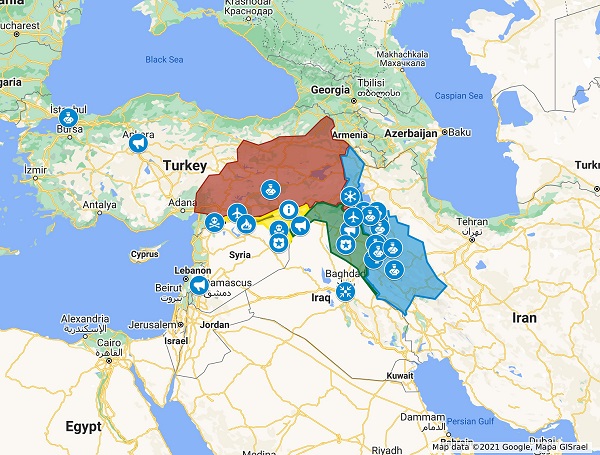1.6K
A weekly brief of events that occurred in the Kurdish regions of Iran, Iraq, Syria, and Turkey.
Iran
- The Iranian regime’s ongoing crackdown on Kurdish political rights has now resulted in at least 70 arrests in Iranian Kurdistan, and at least 25 Kurds were arrested in Bokan Sanandaj, Nagadeh, Piranshahr, Marivan, Saqqez, and Miandoab last week. Meanwhile, the Kurdistan Association for Human Rights (KMMK) reported Iranian authorities arrested two female members of the musical group Galaris named Nazanin Atabaki and Nastaran Yazdanipour. Atabaki and Yazdanipour, who are also adherents of the Yarsan faith, were detained in Kermanshah on Saturday. At the same time, Mehabad’s Islamic Revolutionary Court sentenced two Kurdish siblings, Salara and Saman Gazali, to three years and three months in prison for “disruption of national security.”
- Five Kurdish border porters (Kolbars) who were previously reported missing after an avalanche in the Somai Bradost region were declared dead last week. Local villagers found their corpses on Monday despite Turkish and Iranian border guards’ attempts to hinder search efforts. Concurrently, Iranian border guards wounded two Kolbars near Baneh and Salas-e Babajani, and a Kolbar named Hamza Mohammedi was beaten and tortured before his arrest near Nowsud. Mohammedi filed a lawsuit against the Iranian security forces for his treatment but received additional physical abuse for his attempt to use the legal system.
- Iran’s Kurdish opposition parties celebrated the 75th anniversary of the Republic of Kurdistan (Mehabad) by offering the Kurdish nation congratulations and calling for additional unity against the Iranian regime.
Iraq
- The Kurdistan Regional Government (KRG) sent another delegation to Baghdad to engage in a final round of negotiations with the Government of Iraq (GOI) before the Council of Representatives of Iraq’s (CRI) vote on the 2021 budget bill, which is scheduled to be held in two weeks. The GOI’s continuing failure to provide the KRG with its share of the federal budget has resulted in KRG employees going unpaid and caused unrest in Iraqi Kurdistan. At the same time, disputes between the GOI and KRG remain over issues like the allocation of natural resources, disputed territories, and the payment of salaries to Peshmerga forces.
- Turkish airstrikes on villages near Haji Omaran and Duhok wounded two children and killed hundreds of sheep on Friday. Friday’s airstrikes are part of Turkey’s ongoing military incursion into Iraqi Kurdistan that it claims is targeting the Kurdistan Workers’ Party (PKK) and were followed by Turkish Minister of National Defense Hulusi Askar’s visits to Baghdad and Erbil to discuss coordination against the PKK. Likewise, Turkish President Recep Tayyip Erdogan threatened to invade the Yazidi town of Shingal (Sinjar) under the guise of carrying out joint anti-PKK operations with Iraqi and/or KRG forces. Despite Turkey’s continuing claims regarding the PKK, its operations in Iraqi Kurdistan have killed dozens of civilians and displaced thousands more.
- A US-led coalition airstrike killed seven ISIS (Da’esh) militants near Kirkuk Governorate’s Qara Chokh mountain range, which remains a base of operations from which the terror group has launched numerous attacks on the Peshmerga and Iraqi security forces. Meanwhile, Da’esh attacks on power plants in Diyala Governorate cut the amount of electricity received by Diyala, Kirkuk, and Ninewa governorates by over 60 percent.
Syria
- Turkish forces and their Islamist allies resumed attacks on Kurdish areas of northeastern Syria last week and struck Kobani, Ain Essa, and Tell Rifat. A Turkish indirect fire attack killed four civilians, including two children, in Tell Rifat on Friday, sparking anti-Turkish protests in the town and an appeal to the United Nations (UN) from the Syrian Democratic Council (SDC) requesting the “perpetrators of such crimes be held accountable.” On the same day, a Turkish UAV attacked a house south of Kobani and injured one person. Simultaneously, Turkish proxies launched indirect fire attacks on two villages (Mishirfa and Jahbal) near Ain Essa.
- Da’esh terrorists kidnapped and murdered two female Arab officials, Saada al Harmas and Hinad al Khathir, who were serving on a local council established in Deir Ez Zor Governorate’s Dishisha sub-district. The assassination of the two officials was denounced by several human rights organizations and numerous local and regional political entities. That said, the Syrian Democratic Forces (SDF) announced the arrest of five Da’esh operatives in the governorate last week.
- Tensions rose again between local security forces (Asayesh) and the Syrian militias known as the National Defense Forces (NDF) in southern Qamishli on Saturday, with Kurdish sources claiming the NDF opened fire on an Asayesh post. Though the Autonomous Administration of Northeastern Syria (AANES) presides over most of Qamishli, the Syrian regime continues to control parts of the city collectively known as the “Security Square.”
- The UN-backed Syrian Constitutional Committee failed to achieve an understanding between the Turkish-backed opposition and Syrian regime during the first day of its most recent mediation efforts and will now host a second day of talks between the two parties. Syria’s Kurds were excluded from the talks, which are entering their fifth-round since February 2017, due to Turkish objections.
Turkey
- Turkish authorities arrested dozens of Kurds last week as part of Turkey’s ongoing repression of the pro-Kurdish Peoples’ Democratic Party. In Istanbul, Turkish police surrounded the HDP building and detained eight members for holding a press conference and protesting the isolation of imprisoned Kurdish leader Abdullah Ocalan. Concurrently, Turkish authorities detained at least 20 people, including former HDP lawmaker Hatice Kocaman and two HDP youth organization leaders, in Diyarbakir (Amed). The HDP responded by announcing plans to launch a campaign in February aimed at raising awareness of the “Kobane Trials,” the governments’ ongoing targeting of Kurdish politicians, the verdict of the European Court of Human Rights on the Demirtas trial, and Ocalan’s continuing isolation.

